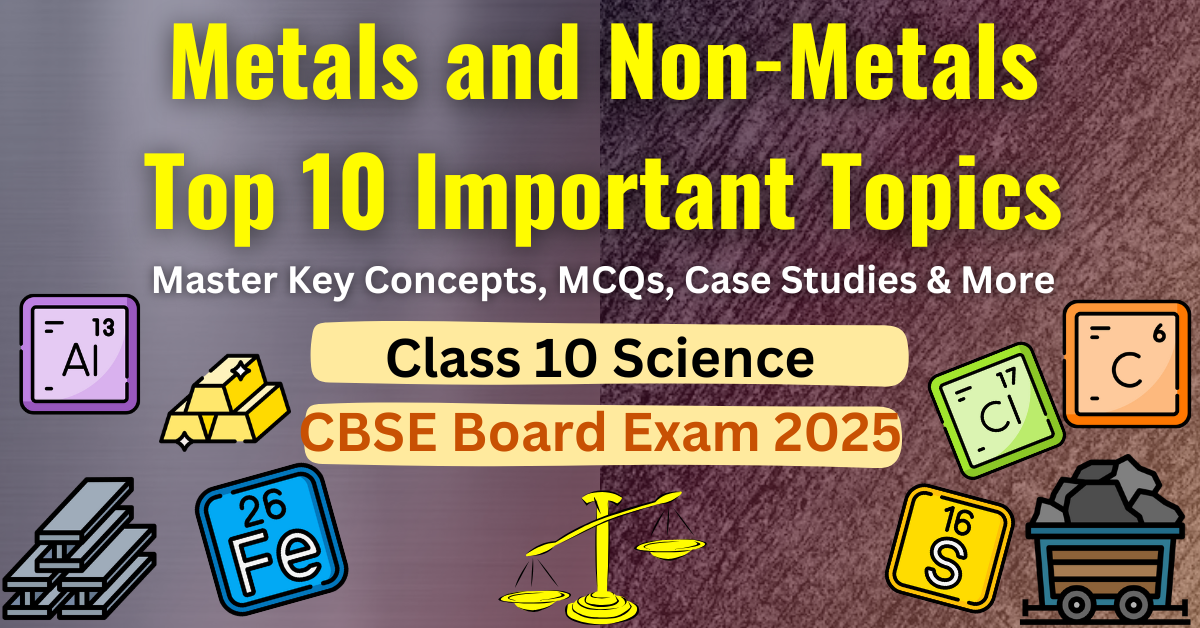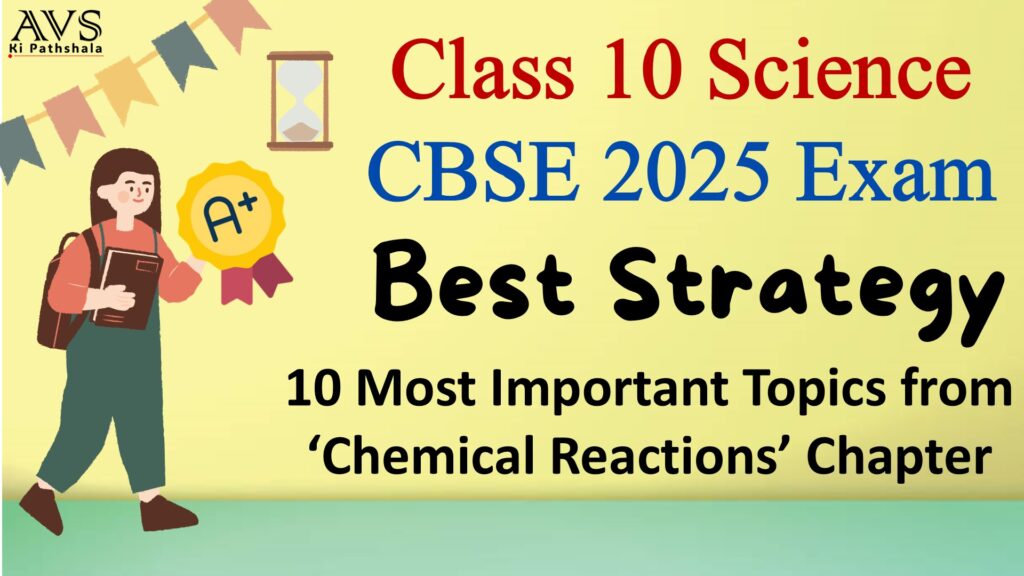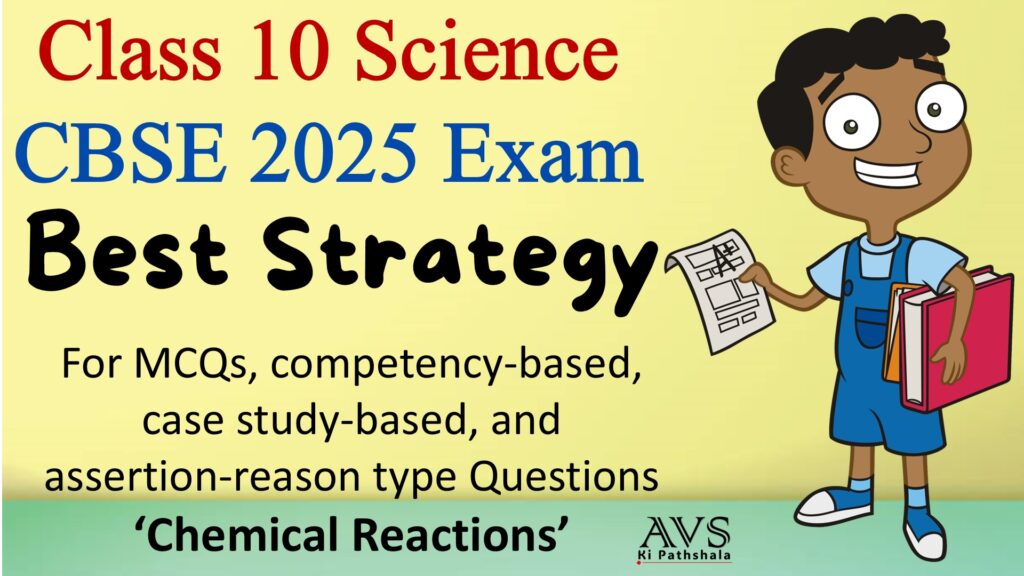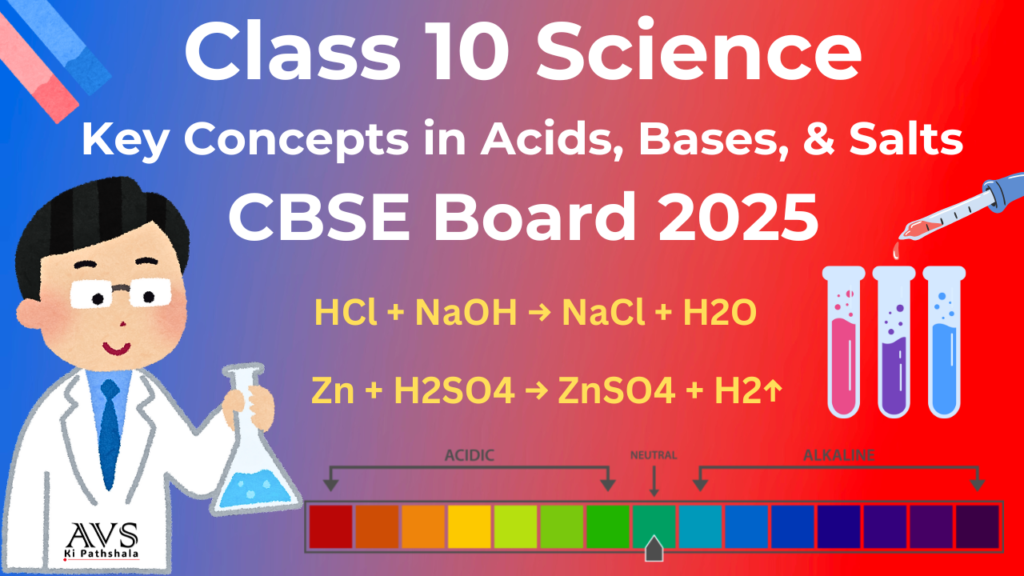The chapter Metals and Non-Metals in Class 10 Science holds significant weight in the CBSE board exams. With a focus on chemical properties, reactivity, and applications, this chapter is crucial for understanding various real-world concepts. To help you excel in your 2025 board exams, we’ve analyzed previous year question papers and predicted the most important topics likely to be asked. This comprehensive guide includes definitions, formulas, and an explanation of the types of questions that can appear from each topic. Mastering these topics will not only boost your conceptual understanding but also improve your performance in both theory and application-based questions.
Top 10 Important Topics in ‘Metals and Non-Metals’ for Class 10 CBSE 2025
1. Physical Properties of Metals and Non-Metals
-
- Priority: High
- Question Type: Very Short Answer (VSA), Definition-based MCQs
- Definition: Physical properties like malleability, ductility, conductivity, and appearance differentiate metals and non-metals.
- Most Likely Question: Differentiate between the physical properties of metals and non-metals. (2-3 marks)
2. Chemical Properties of Metals
-
- Priority: High
- Question Type: Short Answer (SA), Competency-based Questions
- Reaction Examples:
- Metal + Oxygen → Metal Oxide
- Metal + Water → Metal Hydroxide + Hydrogen
- Formula: 2Na + 2H₂O → 2NaOH + H₂↑
- Most Likely Question: Describe the reaction of sodium with water. Why is it kept in kerosene? (3 marks)
3. Reactivity Series of Metals
-
- Priority: Very High
- Question Type: Long Answer (LA), Assertion-Reason Questions, Competency-based
- Definition: The reactivity series ranks metals by their reactivity, with potassium being the most reactive and gold the least.
- Most Likely Question: Explain the reactivity series of metals. How is it useful in predicting the reactions of metals with acids and water? (5 marks)
4. Occurrence of Metals and Metallurgy
-
- Priority: High
- Question Type: Long Answer, Case Study-Based Questions
- Concept: Understanding ores, minerals, extraction methods (roasting, calcination, refining).
- Most Likely Question: Define metallurgy. Describe the steps involved in the extraction of a metal from its ore. (5 marks)
5. Corrosion and its Prevention
-
- Priority: Moderate
- Question Type: Competency-based, Assertion-Reason Questions
- Definition: Corrosion is the gradual destruction of metals by reacting with their environment. Example: Rusting of iron.
- Formula: 4Fe + 3O2 + x H2O → 2Fe2O3.xH2O (Rust)
- Most Likely Question: What is corrosion? How can it be prevented? Give two examples of preventive methods. (3 marks)
6. Alloys and Their Importance
-
- Priority: Moderate
- Question Type: VSA, Case Study-Based Questions
- Definition: An alloy is a homogeneous mixture of two or more metals or a metal and a non-metal.
- Most Likely Question: What are alloys? Why are they important in our daily lives? Give two examples. (2 marks)
7. Extraction of Metals: Electrolytic Refining
-
- Priority: High
- Question Type: Short Answer, Competency-based
- Concept: The process of refining impure metals through electrolysis.
- Most Likely Question: Explain the electrolytic refining of copper. (3 marks)
8. Properties and Uses of Non-Metals
-
- Priority: Moderate
- Question Type: VSA, Short Answer
- Definition: Non-metals have varied properties such as being poor conductors of electricity, and they can be gases, liquids, or brittle solids.
- Most Likely Question: State two properties and two uses of non-metals. (2 marks)
9. Acidic, Basic, and Amphoteric Oxides
-
- Priority: High
- Question Type: SA, Assertion-Reason
- Concept: Oxides of metals are usually basic, while those of non-metals are acidic. Some oxides show amphoteric behavior (e.g., Al₂O₃).
- Most Likely Question: Differentiate between acidic and basic oxides. Give one example of each. (3 marks)
10. Reaction of Metals with Acids
-
- Priority: Very High
- Question Type: SA, MCQs, Case Study-Based
- Formula: Metal + Acid → Salt + Hydrogen
- Most Likely Question: Write the reaction of magnesium with dilute hydrochloric acid. (2-3 marks)
Important Topics for Different Types of Questions in ‘Metals and Non-Metals’ (Class 10 CBSE 2025)
In the CBSE 2025 board exams, questions will be framed in various formats such as MCQs, competency-based questions, case study-based questions, and assertion-reason questions. Below is a classification of the most important topics from chapter “Metals and Non-Metals” of Class 10 Science along with their respective question types.
1. Important Topics for MCQs:
These are typically fact-based or require a basic understanding of definitions, reactions, and properties.
- Physical Properties of Metals and Non-Metals
- Metals are malleable, ductile, and good conductors of heat and electricity, while non-metals are generally brittle and insulators.
- Example Question: Which of the following is a physical property of metals?
(a) Brittle (b) Malleable (c) Non-conductive (d) Dull
- Reactivity Series
- The placement of metals based on their reactivity, with potassium being the most reactive and gold being the least.
- Example Question: Which of the following metals is the least reactive?
(a) Sodium (b) Magnesium (c) Gold (d) Iron
- Reaction of Metals with Acids
- General reaction: Metal + Acid → Salt + Hydrogen
- Example Question: What is the product when zinc reacts with dilute hydrochloric acid?
(a) Zinc chloride and oxygen (b) Zinc oxide and water
(c) Zinc chloride and hydrogen (d) Zinc sulphate and hydrogen
- Corrosion
- Gradual destruction of metals by chemical reaction with their environment.
- Example Question: Rusting of iron is an example of:
(a) Melting (b) Oxidation (c) Reduction (d) Sublimation
2. Important Topics for Competency-Based Questions:
These questions test your application and conceptual understanding.
- Chemical Properties of Metals
- Reactions of metals with oxygen, water, and acids.
- Example Question: Sodium is kept immersed in kerosene oil. Why? (Explain in 2-3 sentences.)
- Electrolytic Refining
- Process used to refine metals, especially copper.
- Example Question: Explain the process of electrolytic refining of copper with a labeled diagram.
- Extraction of Metals
- Concepts of roasting, calcination, and refining.
- Example Question: Explain the steps involved in the extraction of a metal from its ore using the processes of roasting and calcination.
- Metallurgy
- The entire process of obtaining a metal from its ore.
- Example Question: What is metallurgy? How is it useful in everyday life? Give one example of the extraction of a metal.
3. Important Topics for Case Study-Based Questions:
These questions require analysis of a given scenario, experiment, or application.
- Occurrence of Metals and Metallurgy
- Identification of minerals, ores, and extraction techniques.
- Example Question: A case study presents the steps used to extract copper from copper pyrites. Explain why the process involves roasting and what happens in each stage of extraction.
- Alloys and Their Importance
- Importance of alloys in daily life, such as stainless steel and brass.
- Example Question: You are given a case study on the use of alloys in the construction industry. Explain why stainless steel is preferred over iron for making utensils.
- Corrosion and Its Prevention
- Rusting of iron and other examples of corrosion, with preventive measures like galvanization.
- Example Question: Based on a case study of a bridge made of iron that has rusted over the years, explain how galvanization could have prevented this.
4. Important Topics for Assertion-Reason Questions:
These questions test your ability to correlate concepts and reasoning.
- Reactivity Series
- Metals higher up in the reactivity series are more reactive.
- Example Question:
Assertion (A): Potassium is more reactive than copper.
Reason (R): Potassium readily loses electrons to form positive ions.
(a) Both A and R are true, and R is the correct explanation of A.
(b) Both A and R are true, but R is not the correct explanation of A.
(c) A is true, but R is false.
(d) A is false, but R is true.
- Amphoteric Oxides
- Some metal oxides can behave as both acids and bases, e.g., Al₂O₃.
- Example Question:
Assertion (A): Aluminium oxide reacts with both acids and bases.
Reason (R): Aluminium oxide is an amphoteric oxide.
(a) Both A and R are true, and R is the correct explanation of A.
(b) Both A and R are true, but R is not the correct explanation of A.
(c) A is true, but R is false.
(d) A is false, but R is true.
- Corrosion
- The chemical process that gradually destroys metals.
- Example Question:
Assertion (A): Iron objects left in open air rust quickly.
Reason (R): Rusting requires both oxygen and water to occur.
(a) Both A and R are true, and R is the correct explanation of A.
(b) Both A and R are true, but R is not the correct explanation of A.
(c) A is true, but R is false.
(d) A is false, but R is true.
- Chemical Properties of Metals
- Metals react differently with acids, bases, and water.
- Example Question:
Assertion (A): Sodium reacts vigorously with cold water.
Reason (R): Sodium is a very reactive metal and is stored in kerosene to prevent it from reacting with moisture in the air.
(a) Both A and R are true, and R is the correct explanation of A.
(b) Both A and R are true, but R is not the correct explanation of A.
(c) A is true, but R is false.
(d) A is false, but R is true.
Conclusion:
The Metals and Non-Metals chapter is pivotal in understanding the fundamental concepts of chemistry in Class 10. To excel in the 2025 CBSE board exams, focus on high-priority topics such as the reactivity series, extraction of metals, and chemical properties of metals. Make sure to practice various types of questions, especially assertion-reason, case studies, and competency-based ones. By mastering these areas, you will be well-prepared to tackle a wide variety of questions in the exam.
The Metals and Non-Metals chapter presents numerous important concepts, each of which can be tested in different formats, from simple factual MCQs to complex case study-based and assertion-reason questions. By understanding the core concepts and their applications, students can tackle questions in all formats confidently.
Key Points to Remember:
- Metals are malleable, ductile, and good conductors, while non-metals are generally brittle and insulators.
- The reactivity series is essential for predicting reactions.
- Electrolytic refining is a common method for purifying metals like copper.
- Corrosion can be prevented through methods like galvanization and painting.
- Always remember to balance chemical equations and understand the real-world applications of metals and non-metals.
To enhance your preparation even further for CBSE 2025 Exam, you can also connect with us on YouTube, where we will guide you through all these topics in a comprehensive manner. To join us on YouTube, simply click the link below, and you’ve already taken your first step towards scoring better marks.
In the next post, we will discuss the key topics of the chapter ‘Carbon & Its Compounds’.
Note: All the topics covered in this article are based on the “Metals & Non-Metals” chapter of Class 10 Science CBSE Board and have been curated after analyzing previous years question papers. This article can be helpful for students aiming for success in exams, but it’s also important to thoroughly understand the entire syllabus and practice regularly.
Best wishes to all students!
Thank you!





